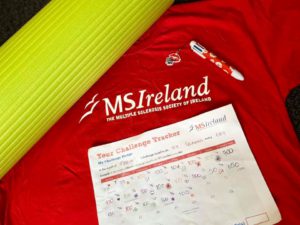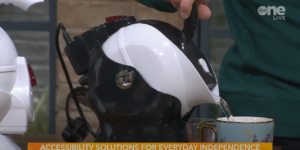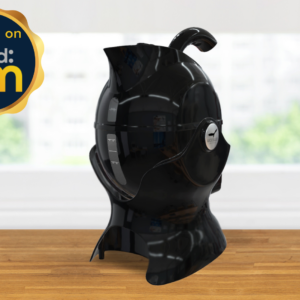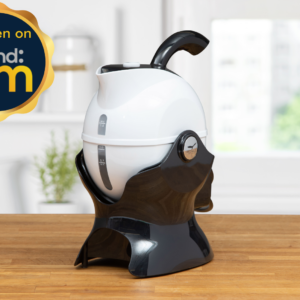It’s been a while now since the country went into lockdown because of COVID-19. We are making progress, (albeit slow progress) to get back to some sort of normal. Since then, I joined the Uccello Designs team as their Marketing Coordinator and love that my skills are ultimately helping the company make more people’s lives easier.
In that year I spent one birthday feeling sorry for myself that I couldn’t celebrate, go out have a few drinks with my friends. This year, I still can’t do those things but I won’t wallow in that. This year I wanted to challenge myself, I wanted to do something that would mean something, and that’s where the MS 3,000 Crunch Challenge comes into play.
I had hear d about the MS Society of Ireland’s March challenge as one of their new and creative ways to boost fundraising and the challenge ended on my birthday. Before I started I wanted to know more about MS as I felt my knowledge on it was general or vague at best.
d about the MS Society of Ireland’s March challenge as one of their new and creative ways to boost fundraising and the challenge ended on my birthday. Before I started I wanted to know more about MS as I felt my knowledge on it was general or vague at best.
I asked around to those closest to me and most could only give me a sentence or two on what it is. It was then that I knew that with this challenge I was also going to learn as much as I could about MS and share that information with others.
During that time I committed myself to 97 crunches a day in aid of raising awareness and money for MS Ireland.
What is Multiple Sclerosis?
MS is a condition that affects your central nervous system (CNS), which is made up of your brain and spinal cord. The central nervous system is what controls your body’s actions and activities. Actions such as movement, the senses, and cognition. It does this by sending messages through a network of nerves. These nerves are covered by a fatty substance known as Myelin.
MS develops when your own body’s immune system, mistakenly attacks this myelin thinking that it is a foreign substance trying to harm you.
Around 8,000 people in Ireland have MS.
It can occur at any age but most symptoms are first seen between the ages of 20 – 40. It is a lifelong condition but it is not terminal. For some the progression is slow and it does not affect the majority of your day-to-day life. Sadly for others, MS can progress rapidly and this can lead to affecting your overall quality of life and you may require additional support and services.
The Types of MS:
There are 4 types of MS, each one with its own characteristics. It may not always be clear what type of MS someone has, especially when it is newly diagnosed but your doctor will be able to base symptom management on your individual needs.
Relapsing-Remitting MS
This is the most common type of MS, also known as RRMS. This is where you may have attacks when your symptoms flare up and these are called ”relapses”. The attack is then followed by a time of recovery where you may have few or no symptoms, called ”remission”. The length of time these attacks can last vary from person to person.
Symptoms of RRMS:
Everyone is different and no two people with MS are likely to have the same symptoms in the same way. The symptoms you experience can depend on the area of your brain or spinal cord that the disease has damaged. Symptoms such as:
- Eye pain and vision issues (double vision)
- Numbness & tingling
- Dizziness
- Sensitive to heat
- Stiff muscles and trouble moving
- Depression
- Difficult time thinking clearly
Secondary Progressive MS
Secondary progressive MS (SPMS) usually begins as RRMS that you may have had for over 10 years.
About 80% of those with RRMS eventually get SPMS.
This means that the relapses and remissions that used to come and go, change into symptoms that steadily get worse.
The change to SPMS can be very difficult to notice and to diagnose even for doctors. There are a few symptoms to help you see if you are beginning to shift into SPMS:
- More weakness and trouble with coordination
- Stiff & tight leg muscles
- Bowel & bladder problems
- A harder time with fatigue, depression, and problems with thinking clearly
Benign MS
Benign MS is a form of the condition where you may have MS for several years without developing any severe symptoms that would affect your day-to-day life. Around 5-10% of people with MS have this form of the condition.
Primary-Progressive MS
Primary Progressive MS (PPMS) is different from the others in that its symptoms from their very first sighting are progressive. Symptoms gradually get worse over time, rather than appearing as sudden relapses.
PPMS mainly affects the nerves in your spinal cord. The main symptoms being:
- Problems with walking
- Weak, stiff legs
- Trouble with balance
Other common symptoms could include:
- Speech to swallowing issues
- Vision problems
- Fatigue and pain
- Bladder and bowel problems
Treatment Options Available:
There is currently no cure for Multiple Sclerosis, but it is possible to treat the symptoms with medicines and other treatments. Treatment depends on the specific symptoms and difficulties each person has.
They may include:
- Treating relapses of the symptoms with steroid medicine
- Treating specific symptoms
- Treatment to help reduce the number of relapses a person may have with disease-modifying therapies.
The use and benefit of these treatments differ from person to person due to the unpredictable nature of MS but there are treatment plans out there and an amazing support network. Feel free to contact the MS Society of Ireland here should you need support or advice.
Assistive Technology – The Uccello Kettle
Assistive Technology is any item, piece of equipment, or product that is used to increase, maintain or improve the functional capabilities of individuals with a disability, limited strength, and/or mobility.
The Uccello Kettle is an assistive tech product and can help you feel safer and more independent in the kitchen. Click here for more














Leave a Comment